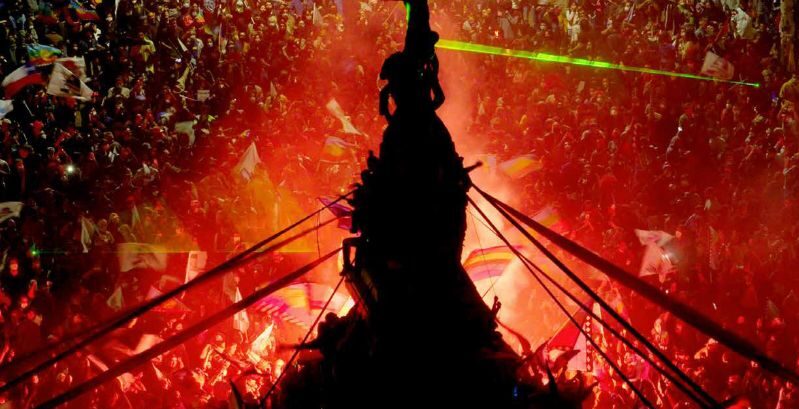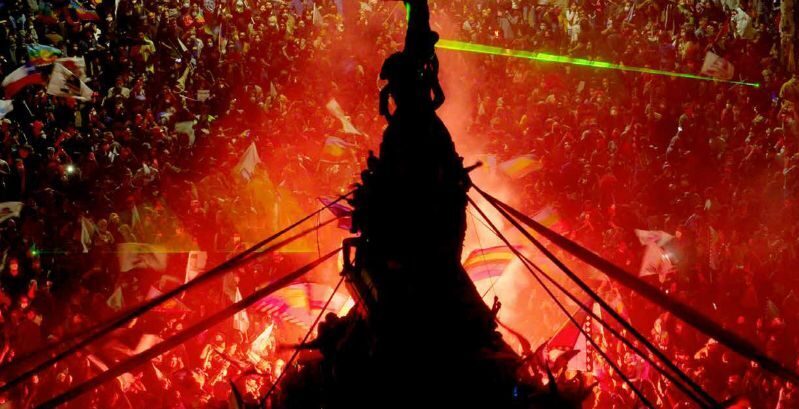
Between 1975 and 1979, Chilean filmmaker Patricio Guzmán released his three-part documentary The Battle of Chile about Salvador Allende’s government and the violent coup d’état that started Augusto Pinochet’s 17-year dictatorship. In his new film My Imaginary Country, almost 50 years after his historical trilogy, Guzmán documents an opposite story of sorts. One more hopeful. The astonishing social uprising in which millions of Chileans took to the streets to shake off the remnants of Pinochet’s rule and fight for a new country.
Guzmán follows the estallido social, from the start of the uprising in 2019 after the increase of public transport fares to the election of Gabriel Boric in December 2021. There’s footage of the protests and interviews with talking heads interwoven with the help of Guzmán’s voice: his narration is smooth and poetic but never pretentious. You can sense the excitement in his voice as he talks about the young generation’s push for a better Chile.
The form of My Imaginary Country is quite conventional but Guzmán’s direction is highly effective. The editing is tight, the pacing is engaging, and the interview subjects are memorable. He talks with doctors, students, a journalist, a writer, a chess player, a fellow filmmaker, a photographer, a psychologist, and members of the LasTesis Collective, a feminist art group whose protest song “The Rapist is You” became an anthem during the uprising. Through all of these figures, the director tackles important themes related to the estallido: the spark that started the movement, the deployment of the army to quench the protests, the police brutality, the numerous eye injuries, the role of feminism, the importance of media, the lasting effects of the dictatorship, and the elections, among others.
Although the film is only 83-minutes long, every interview and piece of footage packs a powerful punch that allows Guzmán to encompass the essence of every theme in just a few minutes. However, there are a few missed opportunities to showcase the diverse range of voices fighting for Chile: Indigenous representation, for instance, is barely talked about in the film.
As someone living in a country where decades of putrid governments have failed to decrease inequality and social injustice, and is now pushing to militarize the country, My Imaginary Country felt like a wake-up call. On more than one occasion I found myself holding back tears while watching millions of people, young and old, become one entity to fight for the future. They pack the streets, tear down walls, and take over statues of military “heroes” to make their voices heard. It’s inspiring footage reinforced by the powerful words of both Guzmán and his interviewees.
But, how was this possible? How did millions of people unite in such an extraordinary manner? Guzmán asks himself the same question at the start of the documentary but struggles to find the exact answer. Although he explains the causes, dives into the ideologies, and showcases the strength of the movement, it’s difficult to distill a definitive answer. My nihilist brain could never imagine a unity such as this ever happening in my own country of México, which maybe made the footage even more impressive.
Unfortunately, My Imaginary Country has an air of melancholy that threatens to stifle Guzmán’s optimism. The last portion of the film is all about the progressive constitutional reform that would end this social movement in victory, but as we know now, this proposal was recently rejected by 62 percent of Chilean voters. You feel as if the country that Guzmán and millions of protestors conceived is truly imaginary. Whether intentional or not, the film works as a warning for how easily media manipulation and conservative power can turn dreams into uncertainty.
Both images and interviews have been resignified but by no means does that topple the spirit of the film. My Imaginary Country is an engaging and inspiring example of the power people have to create change, big and small, through unity despite the historical, political, economic, and social obstacles against them.
My Imaginary Country opens September 23 at the IFC Center in New York and September 30 in Chicago, LA, San Francisco, and Boston. Cover image courtesy of Cinema Tropical.
My Imaginary Country
-
Rating - 8.5/108.5/10
TL;DR
Both images and interviews have been resigned but by no means does that topple the spirit of the film. My Imaginary Country is an engaging and inspiring example of the power people have to create change, big and small, through unity despite the historical, political, economic, and social obstacles against them.







